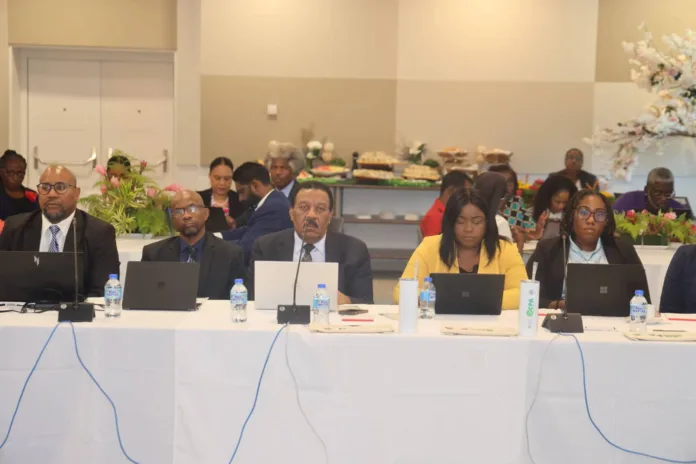The OECS Commission, in partnership with the Caribbean Development Bank (CDB/the Bank), marked the conclusion of the updated Enhanced Country Poverty Assessment (eCPA) Project during a regional conference held from August 5 to 6, 2025.
The two-year second phase of the eCPA Project fulfilled the provisions of the OECS’ Revised Treaty of Basseterre, which created an economic union that facilitates social cohesion and economic development and builds resilience. Participating countries spanned all nine English-speaking OECS Member States: Antigua and Barbuda, Commonwealth of Dominica, Grenada, Montserrat, Saint Kitts and Nevis, Saint Lucia, Saint Vincent and the Grenadines, Anguilla and the British Virgin Islands.
Emphasising the value and impact of the project to countries, speaking on behalf of Honourable Phillip J. Pierre, Prime Minister of Saint Lucia, Honourable Wayne Girard, Minister in the Ministry of Finance, Economic Development and Youth Economy, observed that:
“Data is not just an academic exercise but a tool. Our response should be dynamic.”
The project underscores the OECS Commission’s dedication to comprehensively understanding and addressing the complex dimensions of poverty within the OECS. It does so by addressing poverty in an informed and targeted way through the collection of critical data and by using that evidence to develop, guide and shape impactful interventions.
Dr Didacus Jules, Director General of the OECS Commission, stated:
“The eCPA remains the OECS Commission’s flagship program for generating harmonized monetary and multidimensional poverty, inequality, and vulnerability statistics across our Member States. Aligned with the Sustainable Development Goals (SDGs), the project combines surveys, censuses, geospatial analysis, and institutional assessments to deliver data-driven insights for policy formulation and social protection targeting.”
Also addressing attendees at the High-Level Forum, Mrs. Sisera Simon, Head, Human and Social Division, OECS Commission, remarked that:
“The Enhanced Country Poverty Assessment represents a major advancement in how we understand poverty in our region. No longer are we relying solely on income measures. Through the use of Multidimensional Poverty Indicators (MPI), we now have a richer and more honest view of the challenges our people face — in education, health, housing, employment, and overall quality of life.”
CDB played a vital role in the success of the eCPA Project, providing both funding and technical support. By promoting the use of modern data collection methods, cutting-edge tools and capacity-building, CDB supported OECS Member States in strengthening poverty measurement and gaining deeper insight into the needs of vulnerable groups.
Highlighting the Bank’s commitment to building regional capacity, Ms. Christine Dawson, Acting Director of CDB’s Economics Department, explained,
“This initiative reflects our dedication to evidence-based decision-making and aligns with CDB’s broader goal of reducing poverty and transforming lives, and supports the 2030 Agenda for Sustainable Development and its core pledge to leave no one behind.”
The eCPA collected data through the Living Conditions and Household Budget Surveys, and the national availability of census data, from Grenada, Saint Vincent and the Grenadines, Saint Lucia, the Federation of Saint Kitts and Nevis, Montserrat and the British Virgin Islands. The use of participatory data collection processes ensured the voices of communities were heard. The project also provided capacity-development training and workshops across the Member States to strengthen national capacity to analyse poverty and accelerate the development of evidence-based interventions.
The High-Level eCPA Forum convened Ministers for Social Development, Health, Education and related portfolios, Permanent Secretaries and Senior Advisors, Heads of National Statistics Office, Representatives from development partners, eCPA Technical Specialists and Consultants, as well as OECS Commission and CDB leads.
The two-day hybrid event was held in Saint Lucia and focused on disseminating data and presenting detailed poverty and inequality profiles at both national and regional levels. Designed to be highly practical, it facilitated peer-to-peer learning, the sharing of best practices, and enhanced policymakers’ understanding of how to incorporate data and analysis into national development frameworks for targeted poverty interventions.
The High-Level Forum showcased the use of multidimensional poverty metrics and GIS mapping tools for targeting and policy, as well as shared insights from the Macro Social and Economic Analysis-Integrated Assessment exercises conducted in Saint Kitts and Nevis, Saint Vincent and the Grenadines, and the British Virgin Islands. Participants also joined discussions centred on the role of gender and social inclusion in poverty analysis.
The eCPA was initially launched in 2016 to measure the multidimensional aspects of poverty and living conditions, but was impacted by COVID-19 during implementation. Building on its achievement, the updated eCPA was strategically recalibrated to ensure the attainment of meaningful results to address poverty, vulnerability and socio-economic disparities whilst prioritising data privacy and anonymisation.


